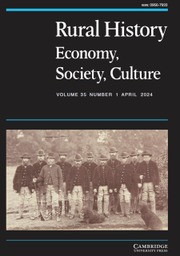Article contents
The Enclosure of English Social History
Published online by Cambridge University Press: 22 January 2009
Extract
It is now roughly a quarter of a century since the proponents of a new social history of early modern England offered students of the period a novel agenda and an unprecedented opportunity. Prior to the 1960s social history had been variously understood as the history of everyday life, of the lower classes and popular movements, or as a junior partner in the relatively recently-established firm of economic and social history (occupied in the main with the study of social institutions and social policy). As such, it had produced more than a few pioneering works of outstanding quality and lasting value (some of them about to enjoy a revived recognition after decades of relative neglect). But it was not a field close to the centre of historical preoccupation. It was at best contextual, at worst residual.
From the early 1960s, however, came a call for a social history of a new type, one conceived as the history of social relationships and of the culture which informs them and gives them meaning. The new agenda was deeply influenced by the social sciences and envisaged an ever closer relationship with sociology, social anthropology and demography. Peter Laslett wrote of ‘sociological history’ or ‘historical sociology’ and Keith Thomas of the need for a ‘more systematic indoctrination’ in the concepts and methodologies of the social sciences. As applied to history, all this was both radical and liberating. In the face of an established curriculum which appeared in many respects restrictive and in some dessicated, it proposed a massive and necessary broadening and deepening of historical concern: the creation of a range of historical enquiry appropriate to the preoccupations and understandings of the late twentieth century.
- Type
- Research Article
- Information
- Copyright
- Copyright © Cambridge University Press 1990
References
Notes
1 Among the most influential of such calls for a new social history were, in chronological order: Thomas, K.V., ‘History and anthropology’, Past and Present 24 (1963)CrossRefGoogle Scholar; Laslett, P., The World We Have Lost (London, 1965)Google Scholar; Thomas, K., ‘The tools and the job’, Times Literary Supplement (7 April 1966)Google Scholar; Hobsbawm, E. J., ‘From social history to the history of society’, Daedalus 100 (1971).Google Scholar There was also the powerful influence of those who taught by example rather than precept, notably Christopher Hill and Lawrence Stone.
2 Laslett, World We have Lost, ch. 10 and passim, and his later ‘Introduction: the necessity of a historical sociology’, in Family Life and Illicit Love in Earlier Generations (Cambridge, 1977)Google Scholar; Thomas, ‘The tools and the job’, p. 275.
3 Alluding to the striking chapter heading of Laslett, World We Have Lost, ch. 10.
4 Quoting the phrase used by Hobsbawm in ‘From social history’, pp. 24–5.
5 Thomas, ‘The tools and the job’, p. 276.
6 Quoting Bailyn, B., ‘The challenge of modern historiography’, American Historical Review 87 (1982), 2–3.CrossRefGoogle Scholar
7 Alluding to Barnes', J.A. concept of ‘structural amnesia’Google Scholar as discussed in Goody, J. and Watt, I., ‘The consequences of literacy’Google Scholar, in Goody, J. (ed.), Literacy in Traditional Societies (Cambridge, 1968), pp. 32–33.Google Scholar
8 Laslett, P., ‘The character of familial history, its limitations and the conditions for its proper pursuit’, Journal of Family History 12 (1987), 273CrossRefGoogle Scholar, and ‘Social structural time: an attempt at classifying types of social change by their characteristic paces’, in Young, M. and Schuller, T. (eds.), The Rhythms of Society (London, 1988).Google Scholar See also the discussion of periodisation in Kelly-Gadol, J., ‘The social relationship of the sexes: methodological implications of women's history’, Signs 4 (1976), 810–12.Google Scholar
9 For example, the works of Keith Thomas, Lawrence Stone, Peter Laslett, Alan Macfarlane and John Bossy.
10 Again, some notable exceptions demonstrate the value of attempting to bridge the medieval/early modern gap. See for example, the works of Christopher Dyer, R.M. Smith, Charles Phythian-Adams, Ian Blanchard, Paul Glennie and Judith Bennett.
11 Jones, G. Stedman, ‘From historical sociology to theoretical history’, British Journal of Sociology 27 (1976), 296, 300.CrossRefGoogle Scholar x Cf. Judt, T., ‘A clown in regal purple: social history and the historians’, History Workshop 7 (1979)CrossRefGoogle Scholar, 67.
12 A point made forcibly in Bailyn, ‘Challenge’, p. 6.
13 Thompson, E.P., ‘Folklore, anthropology and social history’, Indian Historical Review 3 (1978)Google Scholar, 251, 256, 260; Judt, ‘Clown in regal purple’, p. 71.
14 The consequences for the history of the family of the response to Stone, Lawrence, The Family, Sex and Marriage in England, 1500–1800 (London, 1977)Google Scholar, provides an outstanding example.
15 See Cannadine's, David general discussion of the ‘cult of professionalism’ and its consequences in ‘British history: past, present – and future?’, Past and Present 116 (1987), 176–9.CrossRefGoogle Scholar
16 See, for example, the contents of the two most frequently used textbooks: Coleman, D.C., The Economy of England 1450–1750 (Oxford, 1977)Google Scholar and Clay, C.G.A., Economic Expansion and Social Change: England 1500–1700, 2 volumes. (Cambridge, 1984).CrossRefGoogle Scholar
17 Thomas, K., Man and the Natural World: Changing Attitudes in England 1500–1800 (London, 1983)Google Scholar; Slack, P., The Impact of Plague in Tudor and Stuart England (London, 1985)Google Scholar; Macdonald, M., Mystical Bedlam: Madness, Anxiety and Healing in Seventeenth-century England (Cambridge, 1981).Google Scholar
18 Himmelfarb, G., ‘Denigrating the rule of reason. The “new history” goes bottom-up’, Harper's Magazine (April 1984), pp. 84–90.Google Scholar
19 Thomas, ‘The tools and the job’, p. 276.
20 Bailyn, ‘Challenge’, pp. 5, 10–11, 18–19, 22, 24.
21 Wolf, E.R., Europe and the People Without History (Berkeley, Los Angeles and London, 1982), pp. 7ff.Google Scholar
22 Laslett, ‘Character of familial history’, pp. 263–4.
23 Giddens, A., Central Problems in Social Theory: Action, Structure and Contradiction in Social Analysis (London, 1979), pp. 3, 8CrossRefGoogle Scholar; Abrams, P., Historical Sociology (Shepton Mallet, 1982), pp. x–xi, xv, 3.Google Scholar
- 3
- Cited by


